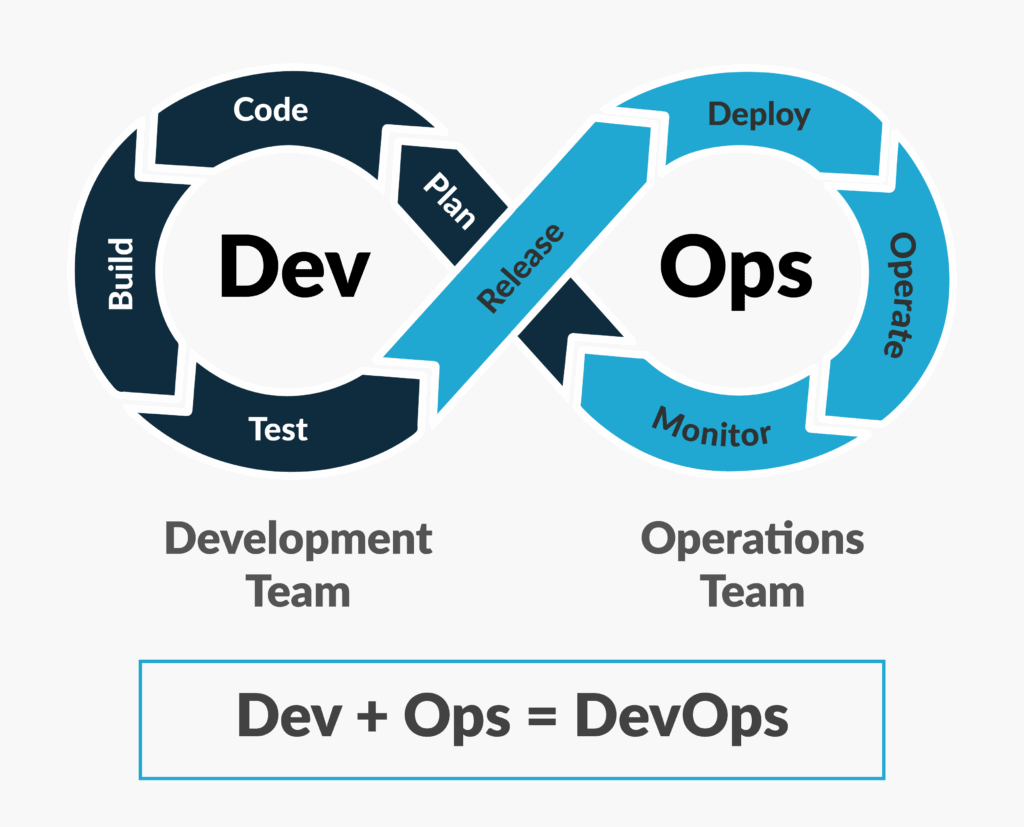DevOps
What is DevOps?

Definition:
DevOps development refers to a set of practices, principles, and cultural philosophies that aim to improve collaboration and communication between development (Dev) and operations (Ops) teams. The goal of DevOps is to enhance the efficiency, speed, and quality of software development and delivery processes. It involves the integration of automation, continuous integration (CI), continuous delivery (CD), and cultural practices like collaboration and shared responsibility, resulting in faster and more reliable software development and deployment cycles.
Analogy:
Imagine DevOps as the streamlined coordination of a theater production. Just as various teams (actors, set designers, lighting technicians) collaborate seamlessly to deliver a successful performance, DevOps involves the collaboration of development and operations teams to deliver high-quality software efficiently.
Further Description:
DevOps development encompasses several key elements:
Collaboration: DevOps emphasizes breaking down silos between development and operations teams, fostering collaboration, and promoting shared responsibilities throughout the software development lifecycle.
Automation: Automation is a cornerstone of DevOps, involving the use of tools to automate repetitive tasks, such as code deployment, testing, and infrastructure provisioning. This reduces manual errors and accelerates the development process.
Continuous Integration (CI): CI involves regularly integrating code changes into a shared repository, allowing automated builds and tests to detect and address issues early in the development cycle.
Continuous Delivery (CD): CD extends CI by automating the delivery of software to production, ensuring that software is always in a deployable state. This enables frequent and reliable releases.
Infrastructure as Code (IaC): IaC involves managing and provisioning infrastructure using code, allowing for consistent and repeatable deployments. It enhances scalability and reduces the risk of configuration errors.
Monitoring and Feedback: DevOps promotes continuous monitoring of applications and infrastructure, providing real-time feedback to identify and address issues promptly.
Security Integration: Integrating security practices into the DevOps pipeline ensures that security considerations are addressed throughout the development lifecycle, enhancing the overall security of the software.
Why is DevOps Development Important?
Faster Time to Market: DevOps accelerates the development and delivery process, allowing organizations to release software updates more frequently and respond quickly to changing market demands.
Improved Collaboration: Breaking down silos between development and operations teams enhances collaboration, leading to better communication, shared goals, and increased efficiency.
Enhanced Quality: Automation, continuous testing, and continuous delivery practices contribute to higher software quality, reducing the likelihood of bugs and errors in production.
Scalability: DevOps practices, such as Infrastructure as Code, enable organizations to scale their infrastructure and applications easily, supporting growth and increased workloads.
Increased Reliability: Automation and continuous monitoring contribute to a more reliable and stable software environment, reducing downtime and improving the user experience.
Examples and Usage:
Amazon Web Services (AWS): AWS incorporates DevOps principles into its cloud services, providing tools and services for automated deployments, continuous integration, and infrastructure management.
Netflix: Netflix utilizes DevOps practices for its streaming service. Continuous delivery, automated testing, and rapid deployment enable Netflix to roll out updates and improvements seamlessly.
Etsy: Etsy, an e-commerce platform, embraced DevOps to improve collaboration and speed up its development and deployment processes. They emphasize automation and monitoring to enhance reliability.
Key Takeaways:
- DevOps emphasizes breaking down silos and promoting collaboration between development and operations teams, fostering shared responsibilities.
- Automation is a key component of DevOps, streamlining repetitive tasks and reducing manual errors to enhance the efficiency of software development and delivery.
- DevOps incorporates CI/CD practices, enabling frequent integration of code changes, automated testing, and reliable, continuous software delivery.
- IaC allows for the consistent and repeatable provisioning of infrastructure, supporting scalability and reducing the risk of configuration errors.
- Continuous monitoring provides real-time feedback on applications and infrastructure, enabling prompt identification and resolution of issues.
Table of Contents




